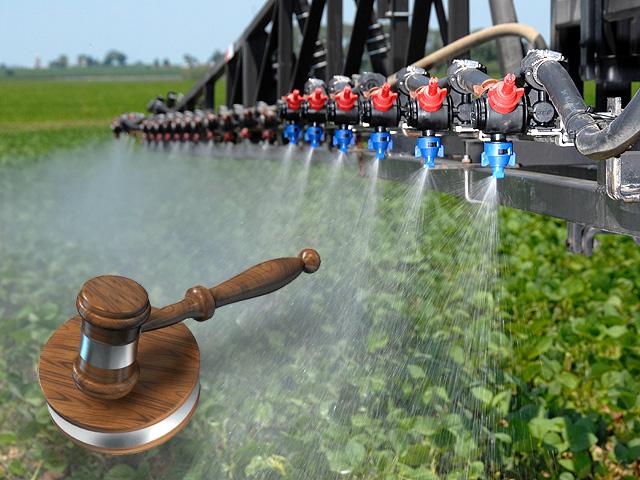Dicamba Court Ruling Appears Imminent
Dicamba Registrations Hinge on Pending Federal Court Decision in Lawsuit
LINCOLN, Neb. (DTN) -- A decision on dicamba's fate could be imminent as a federal court in Arizona continues to consider several motions filed during the past year on a lawsuit aimed at taking several dicamba-based herbicides off the shelves.
George Kimbrell, legal director at the Center for Food Safety and counsel for the plaintiffs in the ongoing lawsuit in the U.S. District Court for the District of Arizona, told DTN the decision from the court could be published or issued any day.
Cross motions for summary judgment and all supporting documents were finished by the parties in July.
"While there is technically no deadline for the court to rule, the parties' papers and past history of the case ensure the court is aware of the farming/spraying season ahead in 2024," Kimbrell said.
The district court in Arizona now has several motions for summary judgment it is considering, including a sealed motion filed by Bayer, BASF and Syngenta. Such a motion asks the court to decide on the case's merits without a trial.
A decision in the Arizona case could determine whether dicamba products will be available for the next growing season, after continued reports of crop damage caused by dicamba drift.
In response to DTN's request for comment, a spokesman for Bayer said they could not comment on active litigation but offered the following statement:
"Bayer stands behind our XtendiMax herbicide. We are fully confident XtendiMax herbicide, when used according to the product label, can be used safely and successfully on-target. We appreciate all the continued efforts made by growers to complete the pre-season training and follow the product label requirements."
P[L1] D[0x0] M[300x250] OOP[F] ADUNIT[] T[]
When contacted by DTN, a spokesperson for BASF provided this statement:
"As we await the court's decision, BASF remains committed to working with grower associations, the EPA, state agencies and other stakeholders so that Engenia herbicide remains available to U.S. farmers. BASF's position regarding the need for over-the-top dicamba products for use in DT-enabled soybean and cotton crops has not changed. Engenia herbicide continues to be a critically needed tool to fight the expansion of herbicide-resistant weeds in soybean and cotton fields. Weed-free fields can lead to higher yields, enabling farmers to maximize their output."
Syngenta did not respond to DTN's request for comment.
In December 2020, the Center for Biological Diversity, National Family Farm Coalition, Pesticide Action Network and the Center for Food Safety filed the lawsuit.
They've argued several changes EPA made to the dicamba registrations of XtendiMax, Engenia and Tavium had not fixed problems highlighted in a ruling by the U.S. Court of Appeals for the Ninth Circuit in June 2020.
The Ninth Circuit vacated those registrations.
In February 2023, EPA posted label amendments to restrict further the use of over-the-top dicamba use in Iowa, Illinois, Indiana and South Dakota, https://www.dtnpf.com/….
The plaintiffs in the case have asked the court to remand back to EPA the registrations.
The last motion for summary judgment was filed in June by 36 state-level corn, soybean and cotton growers associations. Those groups intervened in the case.
"Vacating the dicamba registrations would harm growers, in turn threatening their contributions to domestic and international markets, the agricultural economy and global nutrition needs," the groups said in their motion.
"Growers rely heavily on seed technologies that have been genetically engineered to be resistant to herbicides, including glyphosate. Glyphosate-resistant seed technology is an integral part of farmers' weed-management systems because glyphosate is a broad-spectrum herbicide: it is effective against a wide range of weeds.
"These seed technologies were a major advancement because they made managing weeds more effective and less expensive, and they enabled growers to adopt sustainable and environmentally beneficial farm management practices."
Read more on DTN:
"Groups Want Dicamba Registration Pulled," https://www.dtnpf.com/…
Todd Neeley can be reached at todd.neeley@dtn.com
Follow him on X, formerly known as Twitter, @DTNeeley
(c) Copyright 2023 DTN, LLC. All rights reserved.





